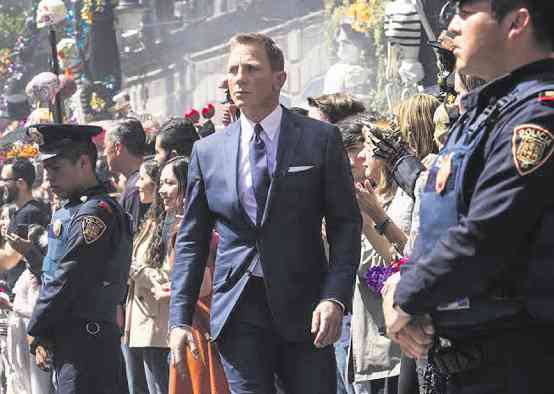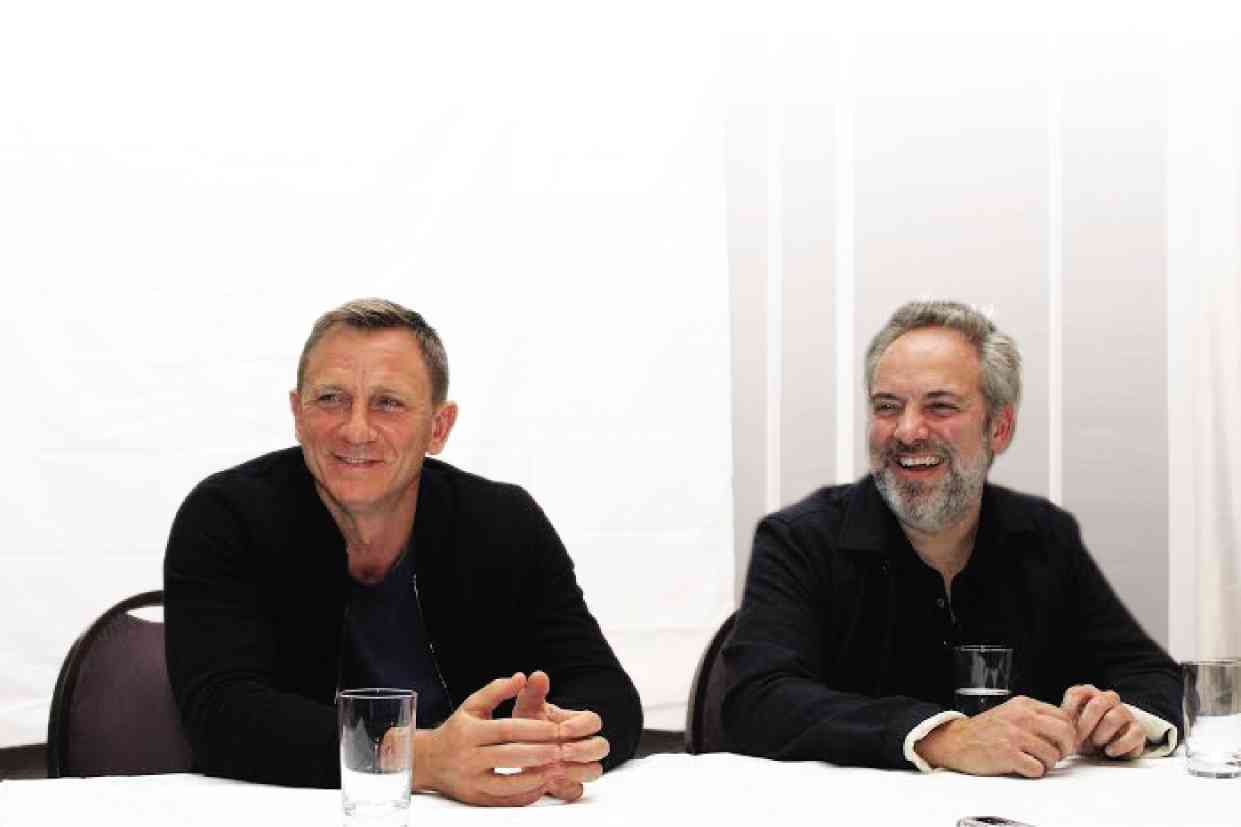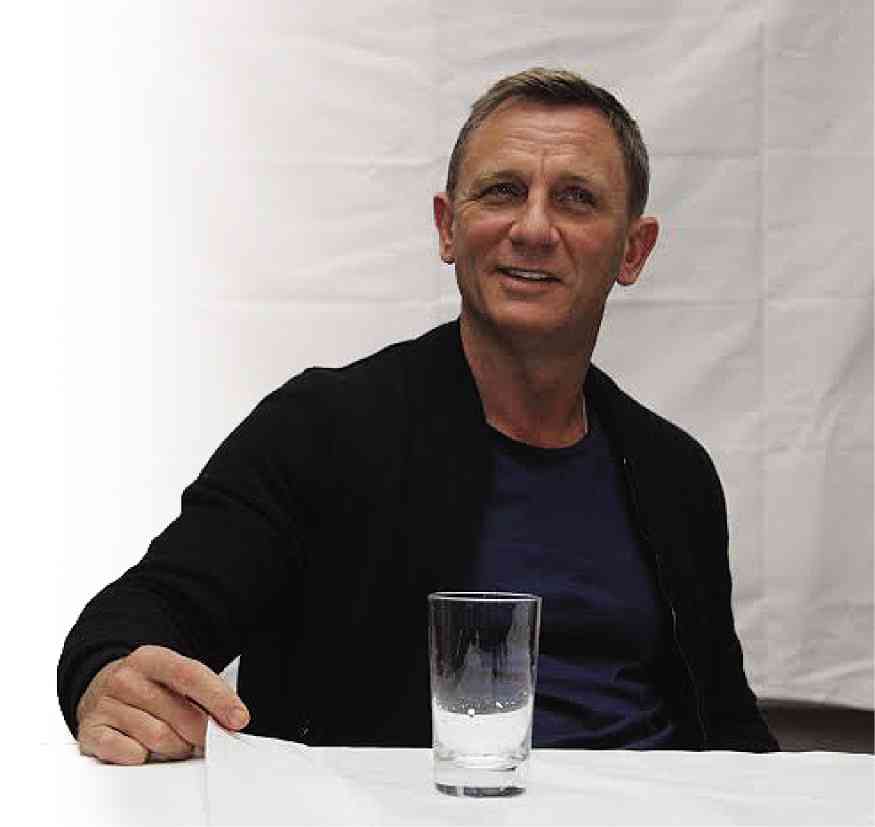A chat with Daniel Craig and Bond film director
LOS ANGELES—Just when you thought that it wasn’t possible to make another topnotch James Bond movie, Daniel Craig and director Sam Mendes serve “Spectre.” It’s a thrilling ride that more than lives up to the tradition of Bond films: gripping action scenes, spectacular locations and suspense.
But as they have adroitly done in “Skyfall,” Dan and Sam also offer drama, emotional involvement in the story and intrigue.
The two collaborators have become best buddies and that showed in how comfortable they were with each other as they sat together to field questions in this interview at the Corinthia Hotel in London. Both casually dressed, the two British men also have obvious respect and genuine admiration for each other’s talent.
Daniel coproduced his fourth 007 outing, which also stars Christoph Waltz, Ralph Fiennes, Lea Seydoux, Filipino-American Dave Bautista (whom I featured in Thursday’s column), Naomie Harris, Monica Bellucci and Ben Whishaw.
Daniel, producer Barbara Broccoli just said that she will never, ever let you go as James Bond.
Article continues after this advertisementSam Mendes (S): As she’s clinging to his ankles (laughs)!
Article continues after this advertisementSo, at this point, what are your thoughts on continuing as James Bond?
Daniel Craig (D): The truth, and I could bulls*** you here but I won’t, is that I have no thoughts about it. Sam, God bless him, just finished this movie and we have been working right up to the wire. All we have been doing is eating, thinking and drinking James Bond for two years. I don’t want it for a while. And what the future holds, I don’t know. That’s the honest truth.
S: I think that is very well put, actually. I feel like I made the mistake last time answering that question (about directing another Bond movie) straight away afterwards. Then I changed my mind because you are not really in a fit state to make those decisions when you just made it. You want to let the dust settle and let everyone watch the movie, respond and find out about real life again. It takes a while.
What would you have liked to know before you began your association with this franchise?
S: I wish I had known what I knew at the end of “Skyfall.” That is one of the reasons that I did “Spectre.” One of the reasons I am very proud of the first 10 minutes of “Spectre” is because I was never entirely satisfied with the first 10 minutes of “Skyfall.”
One of the great things about doing another movie with the same characters, which I have never done before, is that you have a chance to make it better and to work on something on a huge scale and to be completely in control. And Daniel is so fantastic in this movie…
D: That’s what I would have said (laughs).
S: (Laughs) You look at the four movies and you see the growth of Bond as a character and of Daniel as an actor. The thing about “Skyfall” is that Bond was catching up the whole way through. Here, Bond is ahead of everybody and it makes for a much more varied journey.
D: The weird thing is, because I have done four (Bond movies) now, I was in a particular frame of mind when I did “Casino Royale.” There was no judgment on my part. I couldn’t prejudge it. I was experiencing it as it happened.
On the movies after that, there was a bit more pressure on me because of the success, but also because people genuinely want these movies to be good. Honestly, on this film, I went back to where I was on “Casino.” That was mainly due to Sam, to whom I continuously said, “You have had my back.” That allowed me to relax, have fun and enjoy every aspect of the filmmaking, not just playing the part.

CRAIG IN “Spectre”: The Day of the Dead scene represents the movie’s central theme: The past keeps haunting Bond. “The past is never dead.”
This movie is an origin story, in a way. It tells about Bond’s past. Personally, how comfortable are you with your past?
D: The simple answer to that is that we all are. I suppose you ignore your past at your peril and if you try to run away from things, they catch up with you. We all know that and anyone who has lived long enough knows that.
But as far as Bond is concerned, Sam and I wanted our cake and eat it, too. Someone asked me about his (Bond’s) apartment which we have in the film. We worked very closely on that. I had a lot to say about it. We didn’t want to hang any pictures up and we didn’t want to make it look like he lived in it. But he has probably lived in it for 10 years.
And it represents who he is, a man with no base and no roots. One of the great things about the movie is that we could bring in his past and force it upon him and make him confront it. As I said, we wanted our cake and eat it, too.
S: And also, the beginning of the movie says, the dead are alive ( Los muertos están vivos). That’s what the Day of the Dead stands for in South America. The movie has that as well—it’s about your past coming back. The past is never dead.
Judi (Dench’s character, M) is dead but she is still giving Bond a message that a figure, long thought dead, is going to come back and haunt him. The past is the thing that shapes you. Daniel is right—in his (Bond’s) flat, he is just passing through. But one day he is going to have to move in and occupy his own life. That is the choice he makes at the end and I think that is there from the very beginning.
Can you talk some more about the tension for Bond? He seems to be trying to move forward but he is being dragged back into the past.
D: He wants to do the right thing. I don’t think he can. It’s his job, it’s his reason to live. What we hope will be thrown into this are some others that are equally important and are becoming important. There is a love story in this film. It’s the driving heart of this film—to have that there raises the stakes. We had the chance to play around with that. It’s hopefully what I did in the first two movies and it’s what Sam brought to “Skyfall” and we have been able to continue it. I hope we do.
Is Bond a wounded man (emotionally)?
D: I don’t want to play characters who don’t feel. I don’t think they are interesting. Even in the biggest movie, if there is an element of reality and something that keeps the audience connected because they are emotionally invested in the film, that is a winner.
S: But the character in this movie is defined by what happened to him in the previous three movies. This is the man who suffered the death of the woman he loved, the mother figure in his life and the person who was the ultimate authority or the only authority in his life. Bond arrives at this point partly because of those things.
Again, those are woven into the movie and they are there in the opening credits. If you look hard enough, there is Vesper (Lynd) and there is M. There are photos of them and they are talked about. There is an acknowledgment of his history, so he has grown through it. And he is a lot older, much, much older.
Can you talk about the physical challenges? Do they get easier or harder?
D: I started off doing these very physically and I am not going to stop now. I am a bit wiser than I was back then. I don’t bounce as well as I did back then so we have to do it in different ways. All I care about is that it looks right, and getting my face into it so it looks right is the only thing.
So thankfully, Sam and the team that put it together made it seamless. I think it looks like me all the way through. That’s all that matters.
S: Daniel does himself an injustice. He makes it sound like he was only there to put his face into it. But in that train fight, for example, that’s him. That wasn’t trickery. And you can feel it—it was a brutal fight and it needed to be. You can’t do computer trickery and stuff like that.
There’s a tradition behind Bond which is to do things for real. Daniel took that to a new level with “Casino.” As he said, once you started that, it’s very difficult to pull back. But what I would say is that actually, Daniel was in better condition on this one going in and during the filming, than the last one. That made it possible to make the movie in the way that we did.
D: I had to change the way I prepare. It is a very, very conscious decision. I have to adapt to what I can do and it has made it easier in a way.
What was it like working with these two ladies (Monica Bellucci and Lea Seydoux) who are different types and from different generations?
D: You mean one is blonde and one is brunette? Here’s the deal—there is a lot of conversation about this. I want to work with the best there is. When Sam mentioned these two people for these two parts, it was a no-brainer. They lend something completely different to the film. They are two fabulous actresses. They raise the bar when they are on the set. That challenges me and I want to act off of it. So it was just a privilege.

CRAIG relates that Sam Mendes (right) allowed him to “relax, have fun and enjoy every aspect of filmmaking.” RUBEN V. NEPALES
Can you talk about why you cast them?
S: With Monica Bellucci, it’s like saying, “Why did you cast Sophia Loren?” “Because it’s Sophia Loren.” And people say why did you cast a 50-year-old? I had no idea how old Monica was when I asked her. She is just a gorgeous, astonishing woman and a great actress. She brings with her history and a sense of the past and mystery. And she is unbelievably sexy. So for me, age wasn’t an issue. When I met her, she was the one who told me she was older than Daniel.
Lea is remarkable. She had one of those moments that you hope for in auditions when someone picks up and starts reading the lines and they become the person. I didn’t direct that performance. She is just a fine actress.
How has your world changed since you first played Bond?
D: Oh, immeasurably in all sorts of ways. I have gotten older and hopefully a bit wiser. Bond has afforded me so many amazing things. If I had an ambition as an actor, it was to work with the best people that I could.
I am here with Sam and the cast. I don’t know how to describe them—they are just stunning. I am doing what I set out to do. I didn’t think it would scale these lofty heights but it’s what I wanted to do.
(E-mail the columnist at [email protected]. Follow him at https://twitter.com/nepalesruben.)
